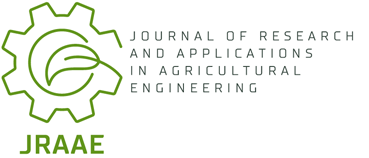Current issue
Online First
Archive
Instructions for Authors
Guide for Authors
Peer Review Policy
Research Ethics Policy
Ghostwriting and Guest Authorship
Copyright
Open Access Policy
Plagiarism
About the Journal
Aim and Scope
Scientific Board
Publisher
Editorial Board
Indexing in Databases
Personal Data Protection
Repository Policy
Contact
ORIGINAL PAPER
Economical, environmental and healthful aspects of ecological food
Journal of Research and Applications in Agricultural Engineering 2006;51(2):209-213
KEYWORDS
ABSTRACT
The marginal position of ecological agriculture is a result of actual economic trends. However at present time there are visible some possibilities for growth and development of this type of agriculture. It is possible thanks to the social awareness about the close connections between humankind and nature. The rural areas cases should be assessed from the viewpoint of a whole and not of the sector.
REFERENCES (20)
1.
Asp E. H.: Factors affecting food decisions made by individual consumers. Food Policy, 24, 287-294,1999.
2.
Dalgaard T., Kelm M.: Energy balance comparison of organic and conventional fanning. Sustainability, Markets and Policies. OECD. CABI Publishing, 127-138, 2003.
3.
Hansen L., Noe E., Hojring K.: Nature and nature values in organic agriculture an analysis of contested concepts and values among different actors in organic farming. Journal of Agricultural and Environmental Ethics, 19, 147-168, 2006.
4.
Hole D. G., Perkins A.J.: Does organic fanning benefit biodiversity? Biological Conservation, 122, 113-130, 2005.
5.
Hawken P., Przez zielone okulary. Jak prowadzić interesy nie szkodząc sobie i innym. Warszawa. 228- 229 &35, 1996.
6.
Hubaceka K., Berghc J.: Changing concepts of 'land' in economic theory: From single to multi-disciplinary approaches Ecological Economics, 56, 5-27, 2006.
7.
Konchak W., Pascual U:. Converging economic paradigms for a constructive environmental policy discourse. Environmental science & policy, 9, 10-21, 2006.
8.
Lund V.: Natural living a precondition for animal welfare in organic farming. Livestock Science, 100, 2-3, 71-83,2006.
9.
Magnusson M.K., Arvola A.: Choice of organic foods is related to perceived consequences for human health and to environmentally friendly behaviour. Appetite, 40,109-117,2003.
10.
Mander U., Mikk M., Kulvik M.: Ecological and low intensity agriculture as contributors to landscape and biological. Landscape and Urban Planning, 46, 169-177,1999.
11.
Mansvelt J.D., Stobbelaar K. Hendriks.: Comparison of landscape features in organic and conventional farming systems. Landscape and Urban Planning, 41, 209-227, 1998.
12.
Michnowski L.: Inkluzywność - uświadomiona konieczność, czy groźny kamuflaż? ,,Forum Klubowe", (22), 3, 37-39, 2005.
13.
Michnowski L.: Kryzys globalny - istota, przyczyny, przezwyciężanie. Transformacje, 3-4, (41-42), 2004, &1-4, (43-46), 2005.
14.
Nieberg H., Offermann F., The profitability of organic farming in Europe. Organic Agriculture: Sustainability, Markets and Policies. OECD. CABI Publishing, 141-151, 2003.
15.
Reganold J.P, Glover J. D.: Sustainability of three apple production systems Nature. 410, 19, www.nature.com 926-929, 2001.
16.
Regouin E.: Considerations of the environmental and animal welfare benefits of organic agriculture in the Netherlands. Organic Agriculture: Sustainability, Markets and Policies. OECD. CABI Publishing, 103-114, 2003.
17.
Rennings K., Ziegler A.: in The influence of different characteristics of the EU environmental management and auditing scheme on technical environmental innovations and economic performance. Ecological Economics, 57, 1,15,45-59, 2006.
18.
Saba A., Messina A.: Attitudes towards organic foods and risk/benefit perception associated with pesticides. Food Quality and Preference, 14, 637-645, 2003.
19.
Torjusen H., Lieblein G.: in Food system orientation and quality perception among consumers and producers of organic food in Hedemark Country, Norway. Food Quality and Preference, 207-216, 2001.
20.
Żakowska-Biemans S.: Oczekiwania polskich konsumentów wobec żywności ekologicznej. Materiały z seminarium pt. Rolnictwo ekologiczne - nowe warunki działania wynikające z członkostwa Polski w Unii Europejskiej. Warszawa, 28 czerwca 53-60. 2004.
Share
RELATED ARTICLE
We process personal data collected when visiting the website. The function of obtaining information about users and their behavior is carried out by voluntarily entered information in forms and saving cookies in end devices. Data, including cookies, are used to provide services, improve the user experience and to analyze the traffic in accordance with the Privacy policy. Data are also collected and processed by Google Analytics tool (more).
You can change cookies settings in your browser. Restricted use of cookies in the browser configuration may affect some functionalities of the website.
You can change cookies settings in your browser. Restricted use of cookies in the browser configuration may affect some functionalities of the website.


